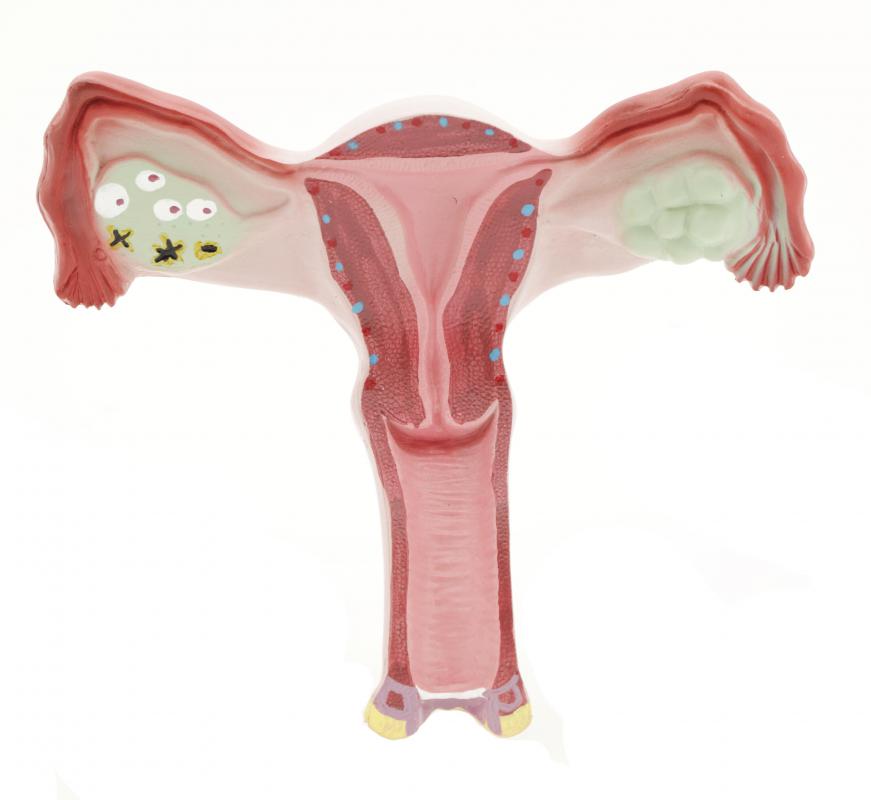At WiseGEEK, we're committed to delivering accurate, trustworthy information. Our expert-authored content is rigorously fact-checked and sourced from credible authorities. Discover how we uphold the highest standards in providing you with reliable knowledge.
What is Luteal Phase Deficiency?
The luteal phase of a woman's menstrual cycle is the time between ovulation and menstruation, during which the body produces the hormone progesterone to prepare for the implantation of a fertilized egg in the uterus. Luteal phase deficiency is a medical condition in which a woman's body does not produce enough progesterone during the phase to allow for a successful pregnancy. A healthy woman's luteal phase usually lasts for about 14 days, but a woman who commonly experiences phases of less than 10 days may be suffering from a luteal phase deficiency and resulting infertility. There are few easily recognizable symptoms of a progesterone deficiency besides the obvious problems with fertility, and the condition must be diagnosed by a trained physician. Fortunately, most women are able to overcome the condition and experience successful pregnancies by taking hormonal supplements as suggested by their doctors.
Progesterone is produced and released by the corpus luteum, a structure that forms during the luteal phase of the menstrual cycle. Insufficient or irregular development of the corpus luteum is a primary cause of luteal phase deficiency in otherwise healthy women. Without the proper levels of progesterone, the lining of the uterus begins to break down, causing early menstruation and preventing a fertilized embryo from attaching to the uterine walls.

Most women with luteal phase deficiencies do not experience noticeable physical symptoms; they simply find themselves unable to keep an embryo after conception. Afflicted women may find that their menstruation cycles are slightly shorter or result in lighter bleeding than average, though such conditions may not necessarily be indicative of a luteal phase deficiency. Women typically experience slightly higher body temperatures during their luteal phases, but those with deficiencies often do not maintain elevated temperatures.

A woman who experiences infertility should consult her primary care doctor or gynecologist, who can conduct tests to check for a luteal phase deficiency and prescribe the appropriate treatment. A doctor usually collects a tissue sample from the uterine lining during just before menstruation and orders a biopsy to determine whether or not a deficiency might exist,. By analyzing biopsy results, tracking a patient's fertility cycle, and physically recording progesterone levels, the doctor can make a proper diagnosis.

Some women are able overcome deficiencies by taking vitamins, especially vitamin B6, and progesterone supplements. If a doctor discovers a severe progesterone deficiency, he or she may prescribe oral medications or suppositories to stimulate proper corpus luteum development and progesterone production. With ongoing treatment, many individuals can maintain appropriate hormone levels and enjoy healthy, normal pregnancies.
AS FEATURED ON:
AS FEATURED ON:














Discussion Comments
@Kat919 - That's a really good suggestion, and it has other benefits as well. The article mentions that a women with a luteal phase defect might be unable to maintain a pregnancy. But because this is all happening so early, she might not even know she was pregnant! She would just get her period.
But if she is taking her temperature, she'll know. If her temperature is elevated for more than 17 days, it almost certainly means that she conceived. If it stays up for, say, 18 or 19 days and then drops and she gets her period, she knows that something didn't work out. Having the knowledge that a very preliminary pregnancy did occur can certainly be painful, but it's important for receiving treatment.
If you are having trouble getting pregnant, I would really encourage you to try troubleshooting your own cycle before having infertility testing, which is expensive and usually not covered by insurance.
You can easily find out if your luteal phase is deficient by tracking your menstrual cycle using your basal body temperature (BBT). You can find detailed instructions online or in books on the Fertility Awareness Method, but the basic idea is that you take your temperature every morning at the same time before you put anything in your mouth or even get out of bed.
You will see the temperature shift upward noticeably if and when you ovulate. You can then count for how many days your temperature stays high before it drops and you menstruate. You could have normal length cycles but still have trouble with the luteal phase if you are a late ovulater, and this is important info!
Post your comments